Publications
From journal articles and theses, to lesson plans and newsletters, the Tracking Change project has produced a number of publications and media products. Browse our graphical search tool below to access our published content or, for a bibliographic listing of publications, please click here.

The value of wild fish: diet and livelihoods in two rural villages in the Mun River Basin, northeastern Thailand
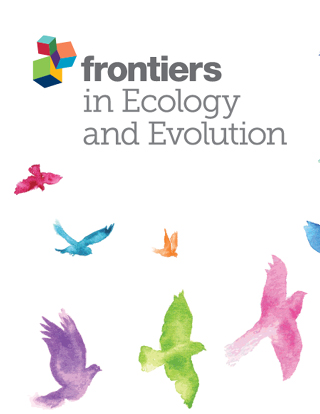
‘Taking Fishers’ Knowledge to the Lab’: An Interdisciplinary Approach to Understand Fish Trophic Relationships in the Brazilian Amazon
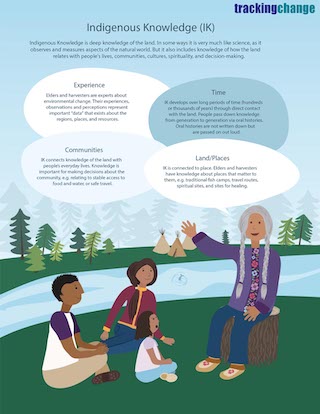
Indigenous Knowledge
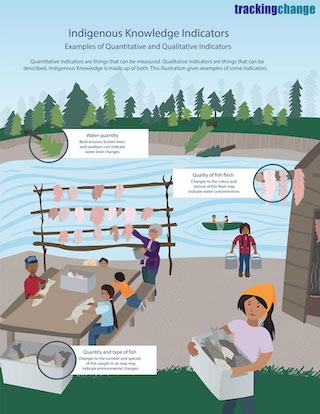
Indigenous Knowledge Indicators – Examples of Quantitative and Qualitative Indicators

Celebrating Our Website Relaunch
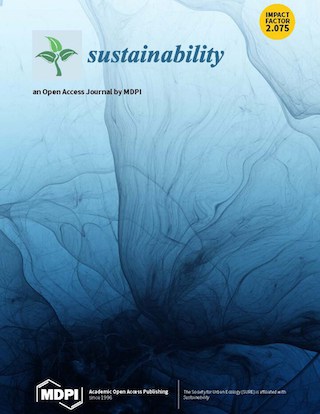
The Impacts of Hydropower Dams in the Mekong River Basin: A Review

Lessons for Science Classrooms: Turning Research Findings into Student Friendly Learning

Culturally Driven Monitoring: The Importance of Traditional Ecological Knowledge Indicators in Understanding Aquatic Ecosystem Change in the Northwest Territories’ Dehcho Region

Fishing Livelihoods in the Mackenzie River Basin: Stories of the Délįne Got’ine

Aligning Intentions with Community: Graduate Students Reflect on Collaborative Methodologies with Indigenous Research Partners

Fishing Livelihoods and Diversifications in the Mekong River Basin in the Context of the Pak Mun Dam, Thailand

Towards Biocultural Conservation: Local and Indigenous Knowledge, Cultural Values and Governance of the White Sturgeon (Canada)

Drinking Water Consumption Patterns: An Exploration of Risk Perception and Governance in Two First Nations Communities

Youth Engagement in Climate Change Action: Case Study on Indigenous Youth at COP24

Cumulative Environmental Impacts in the Gwich’in Cultural Landscape
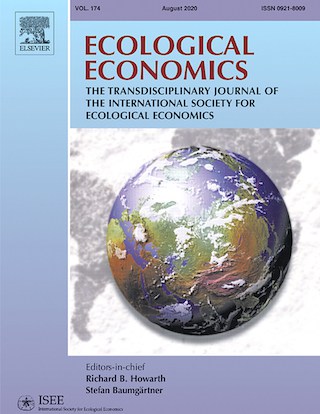
Resource co-management as a step towards gender equity in fisheries

Participatory Research with Fishers to Improve Knowledge on Small-Scale Fisheries in Tropical Rivers

Experiential Science 30 Sustainability and Freshwater Resources

Experiential Science 30: Freshwater Ecology

Experiential Science 30: Disturbance and Development

Science 10: Global Climate Change & Rivers in Different Biomes

Science 10: Climate Change

Science 8: Local Drinking Water

Science 8: Local Aquatic System Health

Science 8: Human Impacts
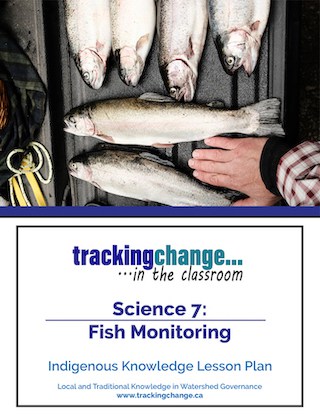
Science 7: Fish Monitoring

Science 7: Ecosystem Shift Aquatic

Science 7: Ecosystem Shift Ice

Science 7: Informed Decision Making
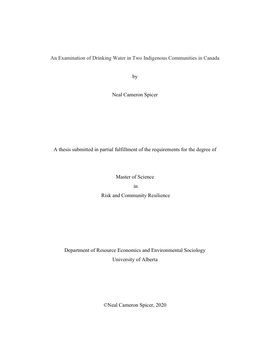
An Examination of Drinking Water in Two Indigenous Communities in Canada

Fishers’ Knowledge Indicates Extensive Socioecological Impacts Downstream of Proposed Dams in a Tropical River

Opening the Gates of the Pak Mun Dam: Fish Migrations, Domestic Water Supply, Irrigation Projects and Politics

Co‐management of culturally important species: A tool to promote biodiversity conservation and human well‐being

Ki Ta Ski Naw: 2019 Wa Ni Ska Tan Hydropower and Energy Justice Gathering and Conference
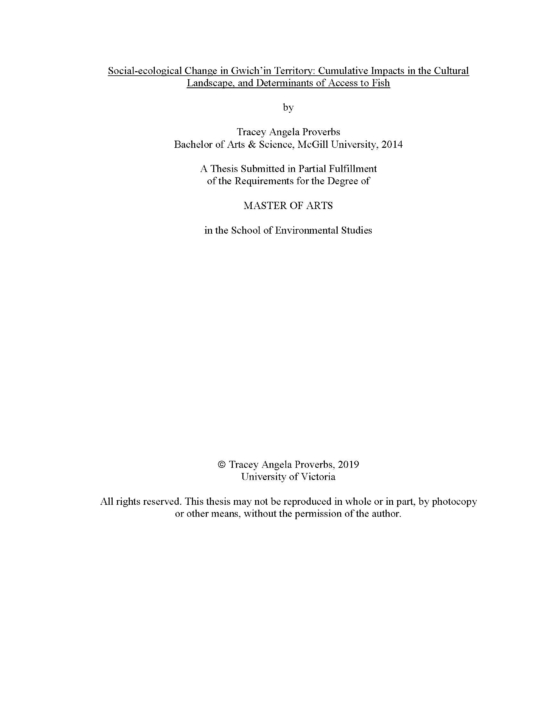
Social-ecological change in Gwich’in territory: cumulative impacts in the cultural landscape, and determinants of access to fish
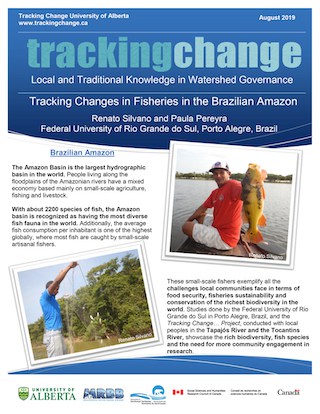
Tracking Changes in Fisheries in the Brazilian Amazon
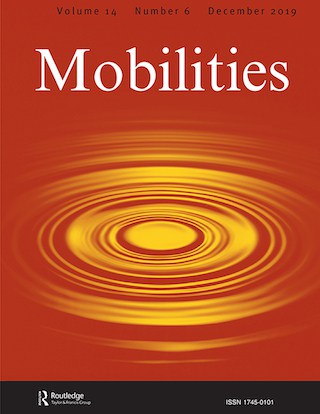
Migrating fish and mobile knowledge: situated fishers’ knowledge and social networks in the lower Mekong River Basin in Thailand, Laos and Cambodia
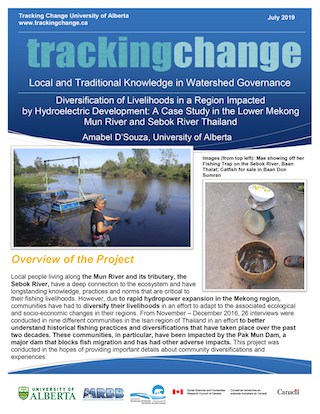
Diversification of Livelihoods in a Region Impacted by Hydroelectric Development: A Case Study in the Lower Mekong Mun River and Sebok River Thailand
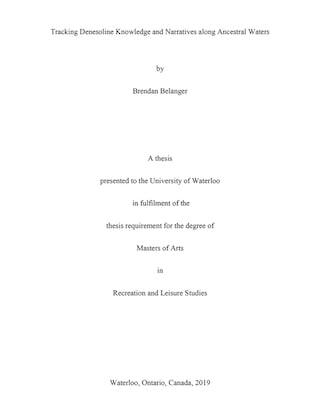
Tracking Denesoline Knowledge and Narratives along Ancestral Waters
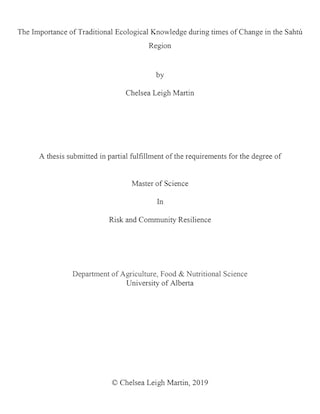
The Importance of Traditional Ecological Knowledge during times of Change in the Sahtú Region
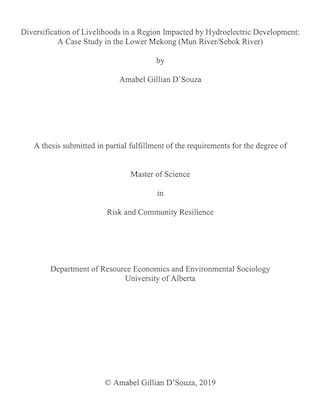
Diversification of Livelihoods in a Region Impacted by Hydroelectric Development: A Case Study in the Lower Mekong (Mun River/Sebok River)
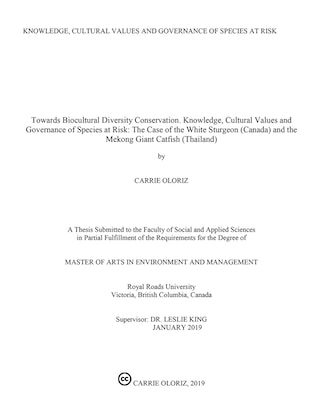
Towards biocultural diversity conservation. Knowledge, cultural values and governance of species at risk : the case of the White Sturgeon (Canada) and the Mekong Giant Catfish (Thailand)

Local and Traditional Knowledge In the Peel River Watershed
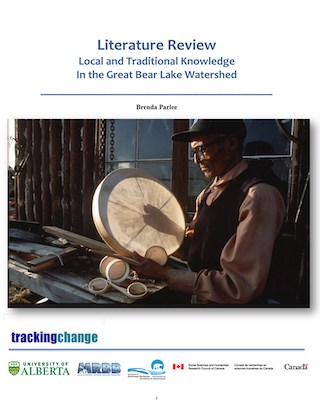
Local and Traditional Knowledge in the Great Bear Lake Watershed

Local and Traditional Knowledge in the Liard River Watershed

Local and Traditional Knowledge in the Hay River Watershed
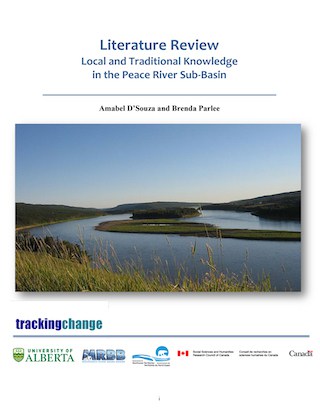
Local and Traditional Knowledge in the Peace River Sub-Basin
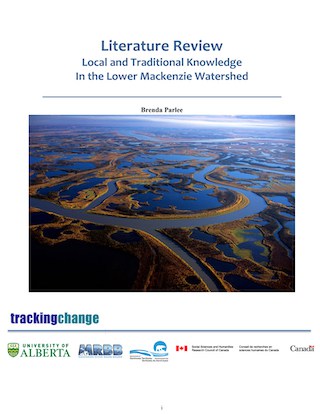
Local and Traditional Knowledge in the Lower Mackenzie Watershed

Local and Traditional Knowledge in the Athabasca River Watershed
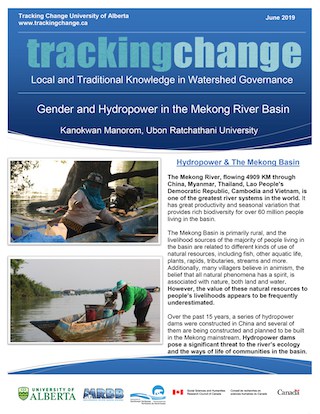
Gender and Hydropower in the Mekong River Basin
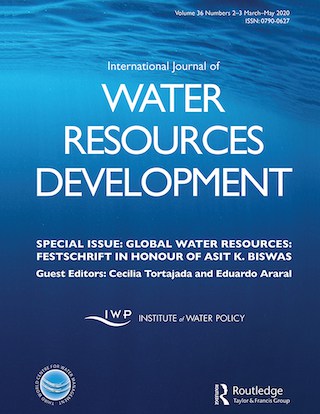
What about the tributaries of the tributaries? Fish migrations, fisheries, dams and fishers’ knowledge in North-Eastern Thailand
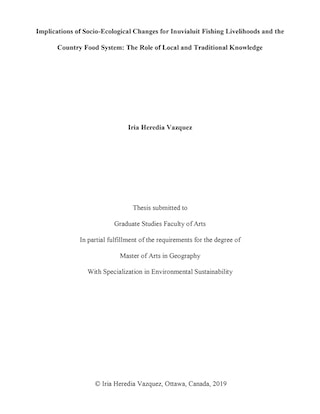
Implications of Socio-Ecological Changes for Inuvialuit Fishing Livelihoods and the Country Food System: The Role of Local and Traditional Knowledge
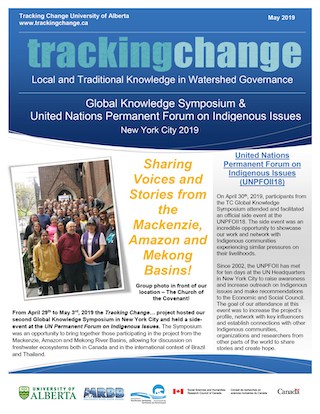
Global Knowledge Symposium & United Nations Permanent Forum on Indigenous Issues — New York City 2019
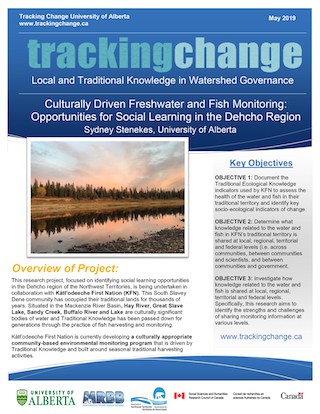
Culturally Driven Freshwater and Fish Monitoring: Opportunities for Social Learning in the Dehcho Region
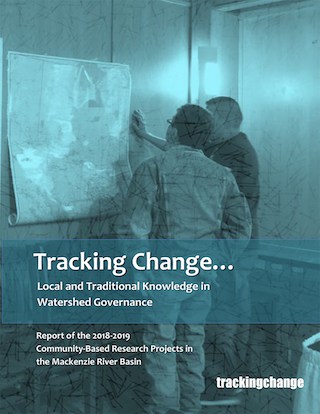
2018-19 Annual Report
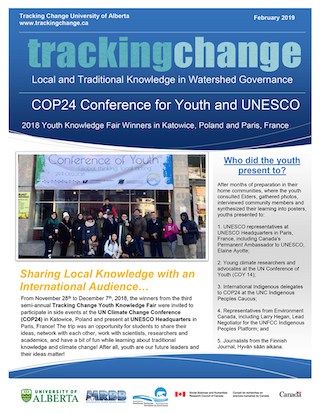
COP24 Conference for Youth and UNESCO
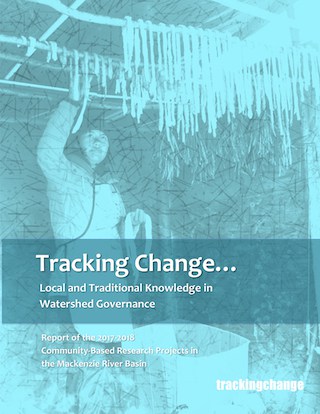
2017-18 Annual Report
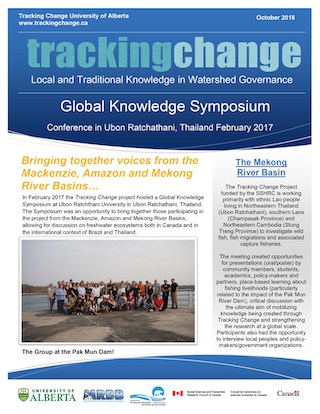
Global Knowledge Symposium Conference in Ubon Ratchathani, Thailand February 2017

Youth Knowledge Fair 2018 Engaging in Discussion on Climate Change
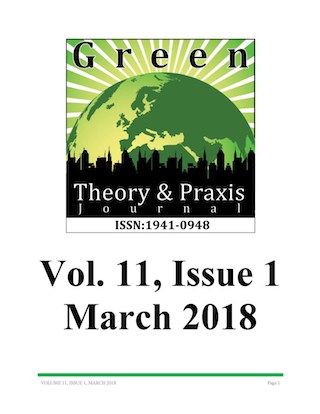
Tu Ɂëhena – “Water is Life”: Tracking Changes on Land, Lake, and River Systems in the Northern Saskatchewan Athabasca Region from the Perspectives of Denesuline Peoples
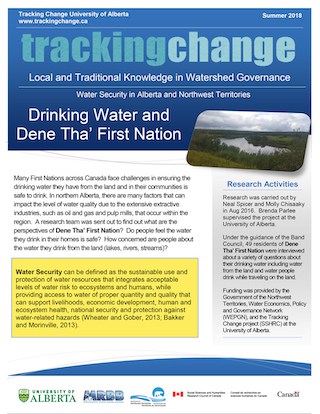
Drinking Water and Dene Tha’ First Nation

Drinking Water and Kátł’odeeche First Nation
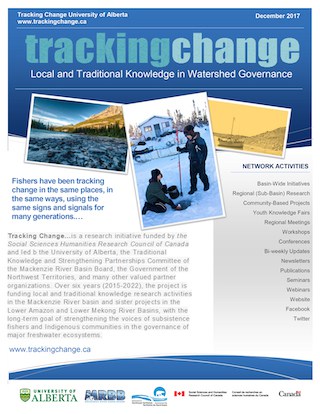
Local and Traditional Knowledge in Watershed Governance
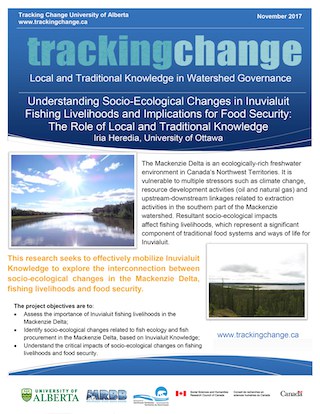
Understanding Socio-Ecological Changes in Inuvialuit Fishing Livelihoods and Implications for Food Security: The Role of Local and Traditional Knowledge
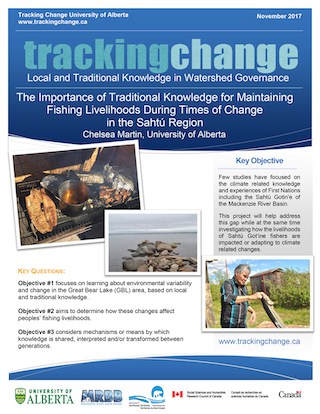
The Importance of Traditional Knowledge for Maintaining Fishing Livelihoods During Times of Change in the Sahtú Region
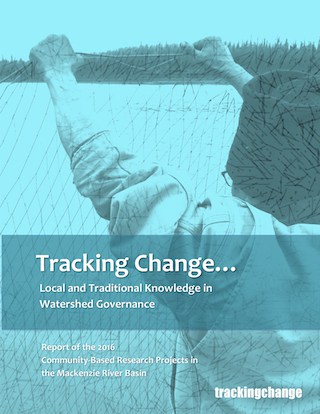
2016-17 Annual Report
